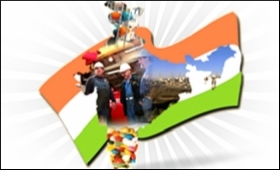|

|
India's economic growth not inclusive enough, inequality rises
|
|

|
|
| Top Stories |
 |
|
|
|
Amit Kapoor | 23 Oct, 2018
The Indian growth story has been far from perfect. That is not an
understatement by any stretch of imagination. A growing challenge for
the economy is the fast-evolving problem of inequality.
Most
recently, James Crabtree in his latest book, "The Billionaire Raj",
claims that "India is one of the world's most unequal countries." His
claim is based on the fact that the billionaire wealth as a proportion
of the entire country's output is the highest for India, except for
Russia. The latest human development rankings released last week also
corroborate his findings. India already ranks a lowly 130 on the index
out of 189 countries but when adjusted for inequality, the scores
experience a drastic fall of almost 27 percent against a world average
of 20 percent.
What explains India's dismal performance on the
inequality front? Why don't other developing countries face a similar
problem? To put it simply, economic growth in India has not been
inclusive enough. All the hype about the country's fast-paced economic
growth has not percolated down through the economy. The
recently-released Social Progress Index can provide an explanation on
why that is so.
The Index, which measures the extent to which a
country can provide for the social and environmental needs of its
citizens, ranks India at 101; a position it had achieved as early as
2014. India is the worst performer among all the BRICS countries and
performs poorly than quite a few other developing countries like
Thailand, Sri Lanka, Philippines and Indonesia as well. The country's
abysmal performance on social and environmental aspects can explain its
widening inequality to a large extent.
To first put things in
perspective, the countries which are performing better on the Social
Progress Index are managing to do so irrespective of their economic
heft; that is, even economies that are poorer than India have ranked
higher. But they have made it possible to have broad-based public
participation in economic expansion by pursuing policies which allow for
extensive schooling, higher literacy, better healthcare, widespread
land reforms and greater gender parity. The only way to maximise the
gains in poverty reduction for an economy is to make it more
participatory, which is not easy to achieve if the webs of social
barriers are not broken down through such policies. Economic advancement
cannot be equitable if social opportunities are not enhanced on a wider
basis.
China offers the perfect case in point for how a large
economy can achieve equitable growth on a sustained basis. China was at
the same economic level as India around 1980 when it undertook market
reforms. At the same time, the country made investments in improving its
basic education and health standards. When China soon became an
export-led economy, the products did not particularly require highly
skilled labour, but schooled and literate population nevertheless. The
production of such basic manufactures for the world markets requires
adherence to certain specifications and quality controls where good
school education comes in handy. A healthy workforce is also imperative
to ensure that economic schedules are not marred by illnesses and
intermittent absences and that adequate productivity is maintained.
Thus,
basic education, good health and decent environment are not only
valuable constituent elements of quality of life themselves but can also
aid in driving economic successes of the standard kind in a more
equitable manner. India has missed the bus on that front. Surely it can
continue to achieve high rates of growth with the rather limited bouquet
of social opportunities that exist currently. In fact, a lot of
complacency arises from the achievement of high growth rates on an
aggregate level. But a status quo would only continue to widen the
disparity across society that has already reached concerning levels.
Most of India's growth arises from industries which make excessive use
of its historic accomplishments in higher education and technical
training. The fruits of such a growth, therefore, are skewed on the
wrong side of the income spectrum.
The problem with the
inequality debate in India is that it is often argued that since poverty
has dramatically declined in the country post-reforms, the trend of
rising inequality should not concern policy-makers as it is a small
price to pay. But, the fact that India is an outlier in terms of
inequality among all developing countries, except an oligarchic Russia,
should raise the alarm bells. Most importantly, if there exists a way
where the gains from existing growth can be more equitably distributed,
clearly that is the Pareto optimal path of development and worth
striving for.
|
|
|
| |
|
|
|
|
|
|
|
|
|
|
|
|
|
|
| |
| Customs Exchange Rates |
| Currency |
Import |
Export |
US Dollar
|
₹88.70
|
₹87 |
UK Pound
|
₹119.90
|
₹116 |
Euro
|
₹104.25
|
₹100.65 |
| Japanese
Yen |
₹59.20 |
₹57.30 |
| As on 30 Oct, 2025 |
|
|
| Daily Poll |
 |
 |
| Who do you think will benefit more from the India - UK FTA in the long run?
|
|
|
|
|
|
| Commented Stories |
 |
|
|
|
|
|
| |
|